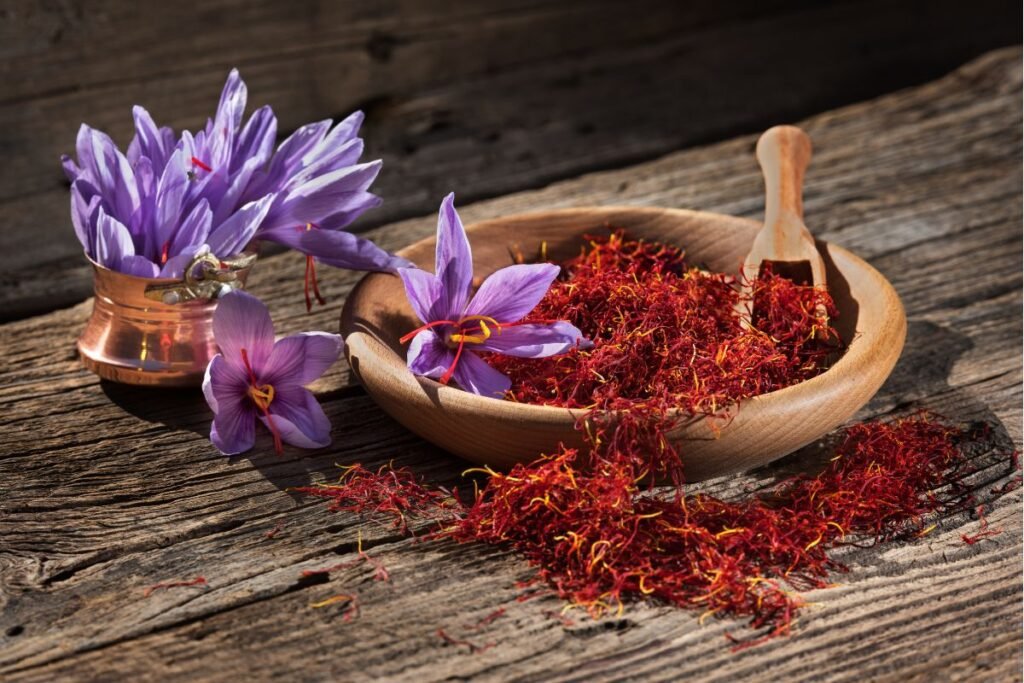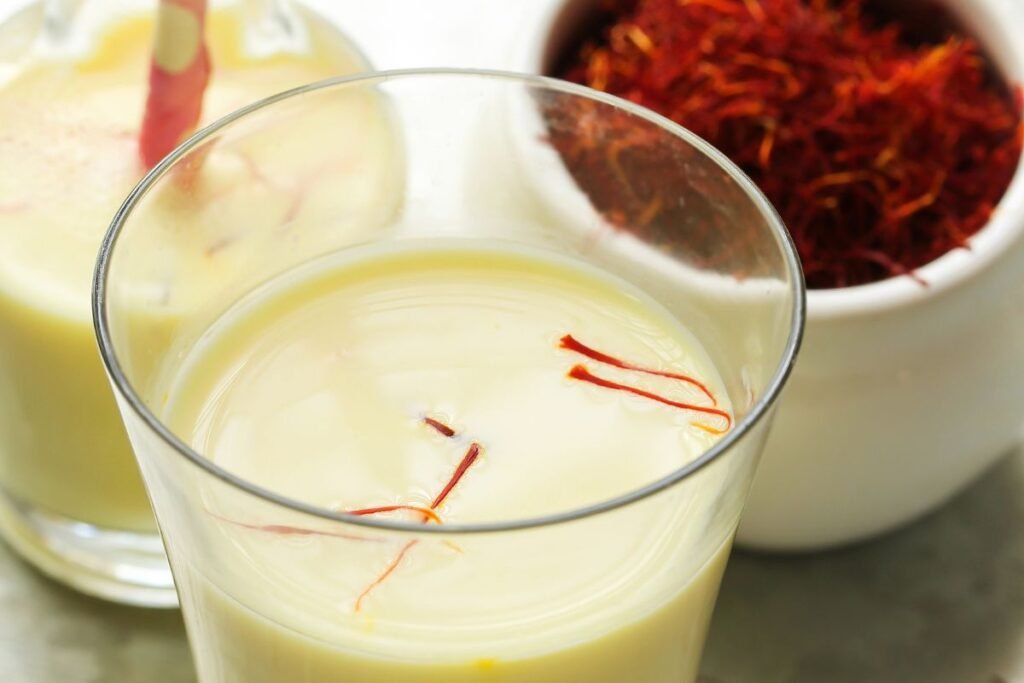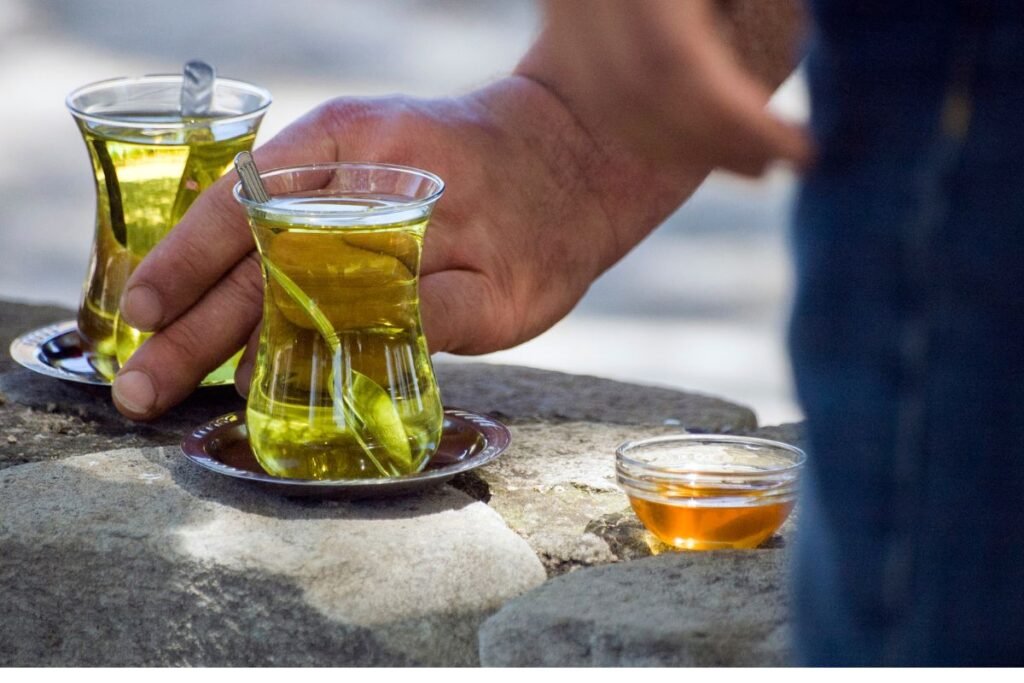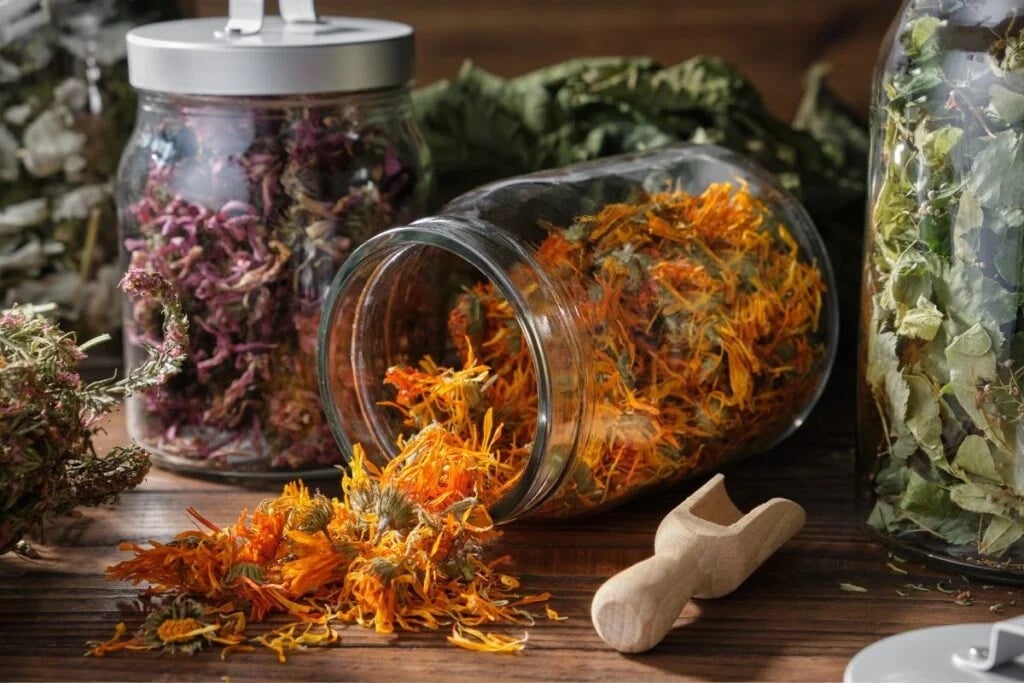Ever wondered about the marvels this vibrant red spice can bring to your daily tea ritual?
Saffron happens to be the world’s most expensive spice, but trust me, its powerful nutritional properties make every penny worth it.
Today, we’ll explore various saffron tea benefits based on actual research and how a cup can add that extra oomph to your well-being.
About Saffron

Saffron comes from the stigma of the Crocus sativus plant, widely cultivated in Greece and Iran. The much-coveted stigma is one of the three fragrant, ruby-colored strands hanging out of the lavender flower.
Saffron contains over 150 chemical compounds, including carotenoids, flavonoids, proteins, vitamins, and amino acids. This unique combination offers various health benefits.
Saffron Tea Benefits
Let’s break down the incredible benefits of regularly drinking saffron tea:
1. Lifts Mood and Battles Depression
Saffron isn’t the sunshine spice for nothing. Some studies suggest saffron might help keep the blues at bay.
- A 2023 study found that saffron tea might be a natural pick-me-up for postmenopausal women.
- A 2013 review in the Journal of Integrative Medicine of several related studies found that saffron could improve the symptoms of major depressive disorder (MDD).
- A more recent literature review of the effects of saffron on mild to moderate depression had similar findings. The red spice could reduce the severity of depression.
Despite the encouraging findings, let’s be clear—saffron tea isn’t a magical cure-all. It’s not meant to replace prescribed medications unless your healthcare provider advises otherwise.
2. Improves Sleep
A 2021 study originally on the Health Benefits of Dietary Bioactives found that saffron enhanced the sleep quality and length in participants with insomnia and other sleep disorders. Plus, the spice helped them to sleep faster.
Your body craves routine, especially when it’s time to hit the hay. A warm cup of saffron tea is the perfect nightly ritual to tell your body it’s time to wind down for a restful sleep.
3. Promotes Heart Health
Saffron tea can be a heart-friendly addition to your daily routine.
A 2011 medical review found evidence that saffron could promote a healthier heart. Packed with antioxidants like lycopene and flavonoids, saffron fights off heart diseases.
Saffron also contains crocetin, which can lower cholesterol buildup and slow down the damage of atherosclerosis. Plus, it’s rich in riboflavin, which helps keep cholesterol levels in check.
What’s more, crocin, present in healthy amounts in saffron, blocks enzymes responsible for fat absorption.
4. Reduces Inflammation
Saffron is an antioxidant powerhouse. It has crocin, safranal, and pirocrocin, which prevent cell damage and reduce inflammation.
These potent chemicals can help protect against various diseases. For instance, a 2020 medical review of a dozen studies analyzed the potential anti-cancer benefits of saffron extracts. Some of the effects observed include:
- Improved antioxidant activity
- Slower cell growth
- Faster cell death
- Suppressed cell cycle progression
Notably, saffron seemed to attack cancer cells while sparing normal cells.
There’s a big but—these findings are mostly from lab and animal testing. To lock in saffron’s anti-cancer powers, we need human trials, just like the next examples.
A clinical trial found that saffron supplementation could relieve ulcerative colitis symptoms, including diarrhea, abdominal pain, and rectal bleeding.
Another clinical trial studied the combined effects of saffron supplements and exercise training in obese men with type 2 diabetes. The results indicated improved inflammatory markers, glycemic levels, and body composition.

5. Treats Menstrual Disorders
More than 90% of women experience symptoms of PMS (premenstrual syndrome), including headaches, moodiness, and bloating. Some have it worse than others.
If you’re not a fan of popping pills to relieve period issues, give saffron tea a shot. Below are some ways saffron can aid menstruation based on a review of six studies:
- Soothes pain better than mefenamic acid
- Prevents heavy bleeding
- Regulates menstrual cycles
- Alleviates abdominal cramps and breast tenderness
- Prevents mood swings
Saffron Tea Side Effects
Saffron tea, as healthy as it is, comes with a few risks.
If you’re expecting, skip saffron tea in the first trimester. A small study published in the Iranian Red Crescent Medical Journal found that large doses of saffron can stimulate the uterus and cause contractions.
If you’re taking meds for hypertension, drinking saffron tea might cause your blood pressure to drop even more.
Saffron tea is generally safe in moderation. You have to chug down large amounts of it in a really short time to experience toxicity and poisoning.
So, consider these potential side effects before making it a regular part of your diet.
How to Make Saffron Tea

Saffron is super pricey, but you’ll only need a few strands to make this simple saffron tea recipe. First, gather your ingredients:
- A pinch of saffron threads (around 5–7 threads)
- Honey or sugar to taste
- 1 cup of hot water
- Lemon wedges and mint leaves for added taste and garnish
Next, let’s make some simple saffron tea to start enjoying its incredible benefits:
- Place saffron in a cup. Pour hot water over the saffron, just enough to submerge the threads.
- Let the saffron steep in water for about 10 minutes.
- Pour freshly boiled water into the cup.
- Add honey or sugar according to your desired sweetness and stir.
- Top with a slice of lemon and a few mint leaves. Let the flavors meld together for a minute.
How Much Is Saffron?
Saffron retails for around $10–$20 per gram. One ounce of imported premium-grade saffron can easily set you back $200 or more.
So, why the hefty price tag?
It’s expensive to produce—only 7% of the saffron crocus plant, handpicked at dawn and carefully dried, goes into the making of this royal spice. It’ll take a thousand flowers to yield just 5 grams of saffron.
Final Thoughts
Remember, saffron tea benefits can vary from person to person. Talk to your doctor first if you’re considering adding saffron tea to your daily routine, especially if you have any health conditions or are taking medications.
For your overall well-being, pair saffron tea with a balanced diet and regular exercise.

